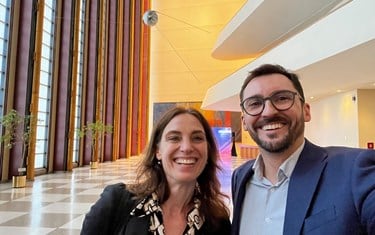Olafiyin Taiwo is an RTPI International Committee Member and Chair of the Commonwealth Association of Planners Young Planners' Network. The network is currently looking for volunteer mentors. More information including a sign up form can be found below:
 The CAP Young Planners’ Network launched the second cohort of the Headway mentoring programme following the success of the first. Designed to address the critical lack of capacity in rapidly urbanising Commonwealth countries, the programme pairs experienced planners with young planners, fostering a symbiotic relationship that benefits both parties. This was the first Commonwealth wide mentoring programme that facilitated knowledge sharing and transfer whilst providing support to young planners from different countries.
The CAP Young Planners’ Network launched the second cohort of the Headway mentoring programme following the success of the first. Designed to address the critical lack of capacity in rapidly urbanising Commonwealth countries, the programme pairs experienced planners with young planners, fostering a symbiotic relationship that benefits both parties. This was the first Commonwealth wide mentoring programme that facilitated knowledge sharing and transfer whilst providing support to young planners from different countries.
Mentees had the opportunity to learn about planning practice from another country and be supported by mentors in senior and executive Planning roles from a country different from theirs. This approach served as a platform for sharing planning processes and practices beyond geographical boundaries.
Mentoring offers knowledge transfer, personal development, and professional growth. As cities and human settlements confront the complex challenges of rapid urbanisation and climate crisis disasters, mentoring opportunities for young planners and other built environment professionals become more important. They provide the opportunity for experienced planners who already possess invaluable insights and varied practical experiences to share their knowledge and wisdom with young planners which is pivotal to ensuring continuity and excellence in the planning profession.
The CAP and its members are not just addressing immediate challenges but are sculpting a brighter future for generations through collaborative partnerships and a steadfast commitment to shared learning. The ripple effect of empowered urban planners echoes in every community, city and human settlements creating a legacy of sustainable development that transcends borders and stands as a testament to the profound impact of thoughtful mentorship and knowledge dissemination in the planning and built environment profession.
For mentors, the act of guiding emerging planners offers a sense of fulfilment and legacy-building. Beyond the joy of seeing shared accumulated wisdom and knowledge applied successfully by another planner in a different country, it reaffirms the mentors’ own expertise while igniting a renewed passion for the profession. Additionally, mentoring provides seasoned professionals with an opportunity for introspection, prompting them to re-evaluate their approaches, familiarise themselves with emerging trends and adapt to changing paradigms—a process essential for professional relevance and growth.
Mentees benefit immensely from the guidance and support of experienced mentors. By tapping into their mentors’ wealth of experience, mentees gain invaluable insights into navigating complex planning scenarios, processes, practice and politics across sectors whilst honing their skills, and cultivating a strategic mindset. Mentees are equipped with tools for addressing career and professional development challenges. Also, mentorship instils confidence in mentees, empowering them to chart their professional trajectory with clarity and purpose.
Beyond the individual focus, the intergenerational exchange facilitated by mentoring contributes to the resilience and innovation of the planning profession as a whole. By bridging the gap between seasoned veterans either retired or in practice and emerging planners, mentoring fosters a culture of collaboration, preservation of knowledge and practice, knowledge-sharing, and continuous learning — a culture indispensable for addressing the multifaceted challenges facing cities and human settlements in the 21st century.
Structured mentorship frameworks, clear communication, and mutual respect have been identified as critical to a successful mentoring relationship. Establishing defined goals, regular check-ins, and opportunities for feedback ensures that mentoring relationships remain fruitful and fulfilling for both mentors and mentees.
Based on the feedback received from the first cohort, second cohort mentees will be expected to use the professional development plan to document and track their goals and ambitions for their career. Additionally monthly capacity building sessions organised and provided with the support of different planning Institutes across the commonwealth will be provided for mentees.
Since the call for mentors and mentees was launched, we have received an enormous response from young planners who are interested in having mentors to guide their steps in expanding their capacity to achieve their goals faster and perhaps inspire them to dream bigger. This call for mentees is now closed.
However, we require mentors who are willing to share their time and expertise to support young planners. The future on the Planning profession does not depend only on the attracting emerging talents to the profession but also supporting them to build vigour and acquire knowledge for continued progress in the field.
As we stand on the cliff of unprecedented urbanisation and climate crisis, the role of mentoring in shaping the planners of tomorrow has never been more critical. By harnessing the power of intergenerational exchange, mentoring cultivates a cadre of planners equipped to tackle the complex challenges of the 21st century with insight, empathy, and innovation.
In conclusion, mentoring in the planning profession transcends mere knowledge transfer; it embodies a commitment to excellence, collaboration, and the cultivation of future leaders. By embracing mentorship as a cornerstone of professional development, planners can harness the collective wisdom of past generations while charting a course towards a more sustainable, equitable, and resilient future.
Are you interested in volunteering as a mentor?
Then please complete the mentoring application form for mentors - http://bit.ly/mentorsC2 by 20th May 2024.


